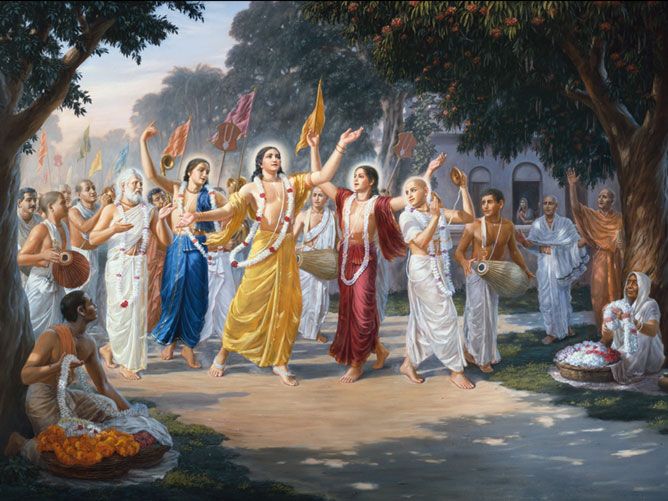Srila Bhaktivinoda Thakura conceived the Nama-hatta, marketplace for the holy name. Marketplaces are defined as places of transactions where products are bought and sold. The Holy Name, of course, is not attained by a series of calculated transactions; it is completely transcendental and beyond the realm of matter. What does it mean, then to purchase and sell an immaterial product? Where does this market exist? If it is free, what does it mean to consider it as having a cost? What is behind this mysterious process and method anyway?
Setting Up the Marketplace: Remembering Mahaprabhu’s Mood
Mahaprabhu’s preaching is constantly accompanied by sankirtan. Fuelled by compassion for the lost souls, he did not wait for anyone to come to him passively. He did not send out invitations to attend his programs or set up tables with literature for anyone to approach on their own accord.
patrapatra-vicara nahi, nahi sthanasthana
yei yanha paya, tanha kare prema-dana
-CC Adi 7.23
In distributing love of Godhead, Caitanya Mahaprabhu and His associates did not consider who was a fit candidate and who was not, nor where such distribution should or should not take place. They made no conditions. Wherever they got the opportunity, the members of the Panca-tattva distributed love of Godhead.
In the divine heart of Mahaprabhu was a desire was to flood the whole world with Krsna-prema. The sound of the holy name went into the ears of anyone wherever he went whether they had any taste for spiritual life or not. His gift of love flowed directly from the Holy Name.
In the 9th chapter of Adi Lila of Caitanya Charitamrita, Mahaprabhu is described as both a tree of transcendental love, the gardener of that tree, and the distributor of its fruits (Krsna-prema). He explains that if he is the only gardener, he is limited in the amount of fruit he can pick and distribute alone. Furthermore, some may accept and others not. Therefore, he ordered each and everyone to help him take up this task to spread the Holy Name everywhere; to become guru and deliver everyone. His goal was nothing short of delivering the entire universe, so preaching could take place everywhere.
Lord Nityananda: Primary Distributor in the Nama-hatta
Eagerness is a primary attribute of those who are inspired to distribute the Holy Name. The greatest example of this, of course, is Lord Nityananda. He went forth carrying the order of Lord Caitanya: “Speak about Krsna, worship Krsna, and teach others about Krsna,” (Sri Caitanya Bhagavat Madhya 13.8.)
He went from door to door, very humbly begging anyone and everyone to chant. He did this with a great feeling of respect for all, expecting no respect in return. Srila Bhaktivinoda Thakur has written:
jadi nama kinbe, bhai
amar sange calo, mahajaner kache jai
O brother, if you want to buy the Holy Name, then go with me. We must go to the presence of that great soul, Nityananda.
The Innovator of the Marketplace: Srila Bhaktivinoda Thakura
Srila Bhaktivinoda Thakura personally travelled to so many places and established over 500 Nama-hatta sanghas. He organised roles for running the Nama-hatta smoothly. Each Nama-hatta was headed by a commander who took care of the members of the Nama-hatta (employees). He designated the traveling preachers who went from door to door as salesmen. Finally, he considered himself simply as the sweeper whose purpose was to help maintain purity by speaking Harikatha and singing kirtans at the houses he visited.
Srila Bhaktivinoda Thakura’s modern-day Nama-hatta mission continued with Srila Prabhupada. His disciples including HH Jayapataka Swami (Minister for Congregational Preaching), HH Bhakti Raghava Maharaja, Bhakti Purushottama Swami, and Gauranga Prem Swami have expanded these Nama-hatta by the thousands throughout West Bengal, Bihar, and Orissa. This enthusiasm has rippled out and initiated thousands of more Nama-hattas all over the world.
What Do Nama-hattas Accomplish?
• Provide regular opportunities to associate with devotees even if they live far from temples
• Support advancement in spiritual life for householders, even as they are busy with work and family
• Serve as expansions of temples to reach out and include all
• Connect aspirants to Harinam initiations
• Avail welcoming places for those who have received Srila Prabhupada’s books and other various newcomers
• Preaching facilities without taking funds from temple collection
• Facilitate practice for preachers, including young people and women
Our Call to Action Within the Nama-hatta
When we regularly honor and remember Mahaprabhu’s mood and Srila Bhaktivinoda’s Nama-hatta method, we gain the necessary enthusiasm to carry out this divine mission. If we can get even a tiny bit of their compassion and magnanimity, our efforts for spreading Harinam sankirtan and preaching will be blessed.
Through sincere adherence to the Nama-hatta structure, the movement gets nurtured and grows. Bhakti-vriksha groups have been implemented through the Congregational Preaching Developmental Ministry of ISKCON in order to carry out the order of our “divine gardener” Mahaprabhu and to please our previous Acaryas including our Founder, His Divine Grace A.C. Bhaktivedanta Swami Srila Prabhupada.


 Creating Markets of the Holy Name
Creating Markets of the Holy Name